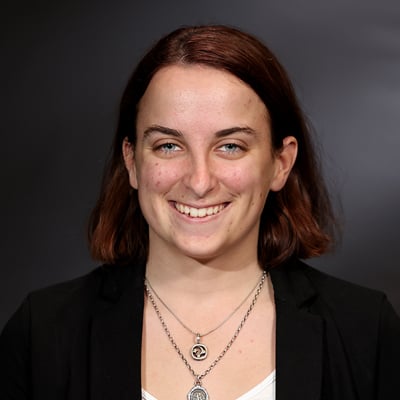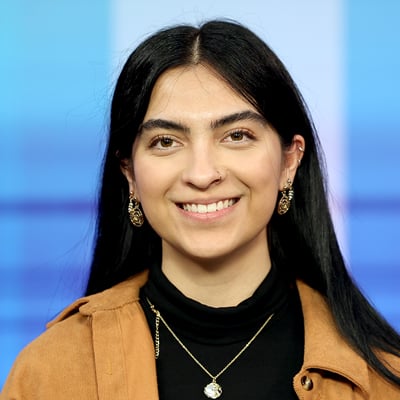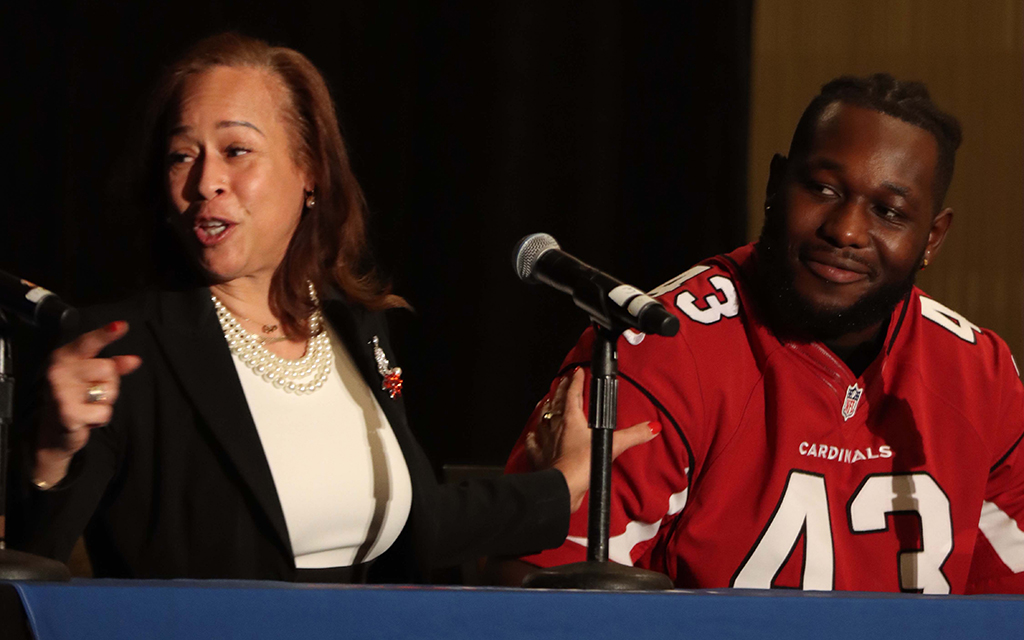
Collette V. Smith, who was the first Black woman to coach in the NFL, and Arizona Cardinals player Jesse Luketa speak as part of a panel at the It’s a Penalty event in Phoenix Jan. 25, 2023. (Photo by Paula Soria/Cronkite News)
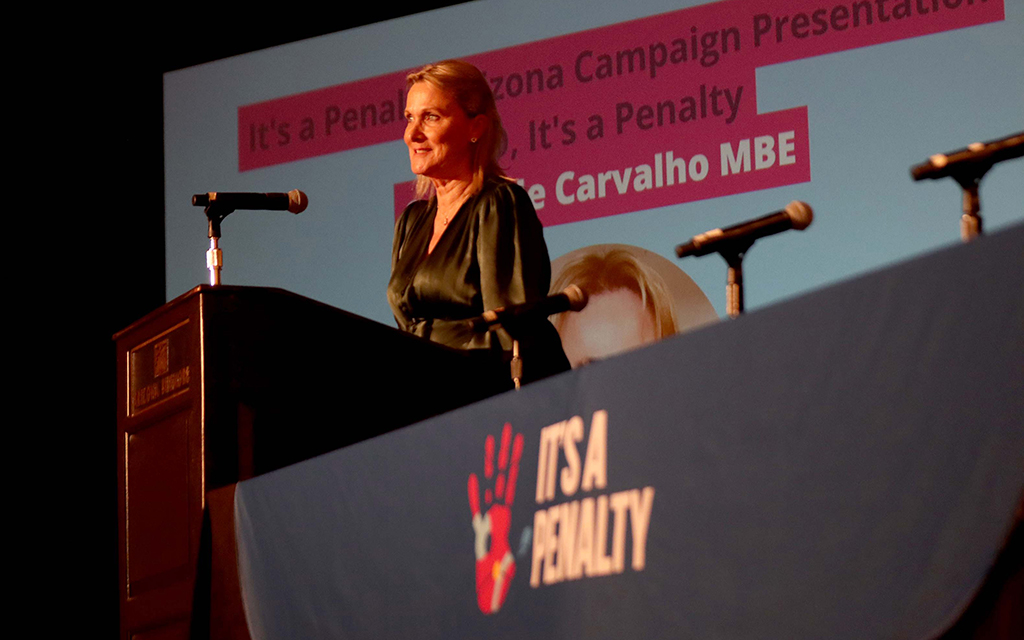
Sarah de Carvalho addresses the importance of human trafficking prevention in preparation for the Super Bowl during the It’s a Penalty event in Phoenix Jan. 25, 2023. (Photo by Paula Soria/Cronkite News)
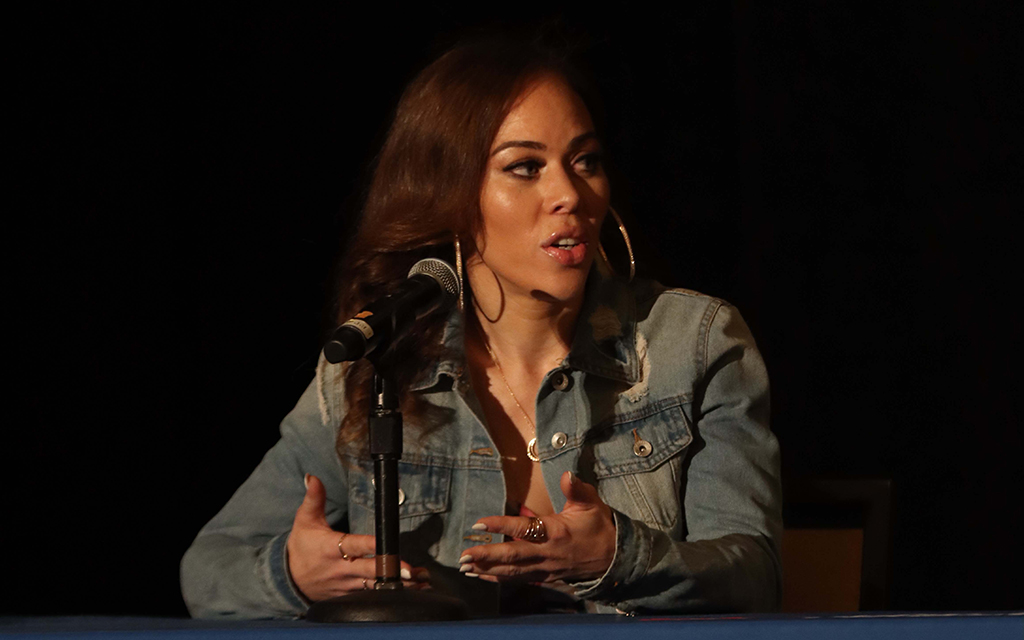
Lois Cook, a player for the women’s football team D.C. Divas, speaks during a panel at the It’s a Penalty conference in Phoenix Jan. 25, 2023. (Photo by Paula Soria/Cronkite News)
PHOENIX – Alicia Tucker, a survivor of human trafficking and a mother, stood in front of a room full of individuals all fighting for the same thing: eradicating human trafficking. Tucker told her story to a crowd for the first time last week, recalling being 15 years old working at a hair salon and being approached by a grown man who made promises that pulled her into a life of exploitation.
“I became a slave to his needs and any man that had money,” said Tucker, who spoke at an It’s a Penalty anti-human trafficking event in Phoenix Jan. 25.
Tucker wanted out, and in 2017 finally got there. While in the hospital giving birth to twins, she was connected to the Phoenix Dream Center, a program of Where Hope Lives, and within 24 hours the director showed up with two car seats and brought Tucker and her daughters to safety.
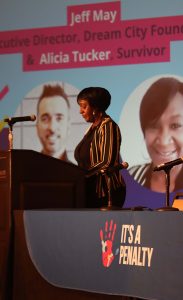
Alicia Tucker shares her story during the It’s a Penalty event. “Now in 2023, I am a survivor, I am a mother, and I have a voice and I’m here to stand up against human trafficking and exploitation,” Tucker said. (Photo by Paula Soria/Cronkite News)
Where Hope Lives set her up with classes, therapy and the tools she needed to restore her life. Jeff May, executive director of the Dream City Foundation, which supports Where Hope Lives, touts it as the largest human trafficking and recovery operation in North America, second largest in the world, and it’s located in Phoenix.
“Now in 2023, I am a survivor, I am a mother, and I have a voice, and I’m here to stand up against human trafficking and exploitation,” said Tucker.
It’s a Penalty is an organization working to prevent abuse, human trafficking and exploitation worldwide. It campaigns around major sporting events year-round with the goal of eradicating exploitation, abuse and human trafficking by 2030.
The Super Bowl is a huge sporting event that brings together thousands of people in the host city with up to 150,000 expected in the Valley for Super Bowl LVII. It’s a Penalty brought together well-known names in sports, hospitality and tourism to shine a light on the topic ahead of the big game. Putting up signage and getting celebrities and business leaders to speak out about human trafficking – especially during media-heavy events – brings awareness to the issue and gets more people on the lookout for signs of human trafficking.
One study found that although there was an increase in the sex selling and buying market in northern New Jersey and the Phoenix area in 2014 and 2015 when they hosted Super Bowls, there is no empirical evidence showing a correlation between the game and increased human trafficking. The multiyear study from the Arizona State University Office for Sex Trafficking Intervention Research was supported by the McCain Institute for International Leadership.
“Let’s be clear, the Super Bowl ends, but the problem does not,” said Amy Love, chief of staff for Arizona Attorney General Kris Mayes. “We must work 24/7, 365 days a year to combat this crime statewide, and if you see something, say something.”
The U.S. Department of Homeland Security, citing data from the United Nations International Labour Organization, says human traffickers victimize an estimated 28 million people worldwide, with 80% subjected to forced labor and 20% to sex trafficking. The average age of sex trafficking victims in Arizona is between 13 and 15 years old, Love said, noting that nearly half the victims know their trafficker, many of whom connected online and through social media.
“If teenagers are using a platform, so are predators,” Love said.
The 2022 Youth Experience Survey of youth experiencing homelessness in Arizona indicated that 40.4% of respondents had experienced at least one form of exploitation, 23.6% reported experiencing sex trafficking. Exploitation for sex began as young as age 12, with the average age for first exposure being 16.9 years old.
The same percentage, 23.6%, reported experiencing labor trafficking, first between ages 12 and 20, with an average age of 16, and 33.3% of participants identified their relation to the trafficker as a friend. According to Mary Kim Titla, executive director of United National Indian Tribal Youth, 40% of human trafficking survivors are Native women.
It’s a Penalty founder Sarah de Carvalho spoke at last week’s event in Phoenix about how everyone is vulnerable – no matter who they are or where they live.
“Traffickers will take advantage of that vulnerability to coerce and to make the individual kind of attach themselves in such a way that they work for them or they’ll do something as a result,” de Carvalho said.
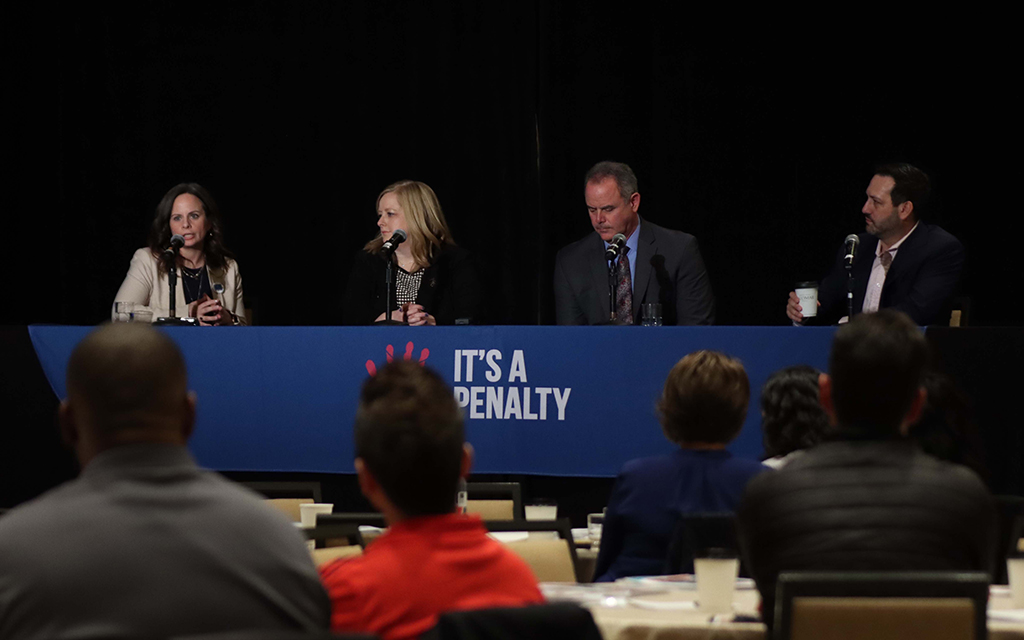
From left, hospitality leaders Eliza McCoy, Rose Walz, Mark VanBeest and Jay Caiafa speak during a panel on hospitality safety at the It’s a Penalty event. McCoy is vice president of prevention and awareness programs for the American Hotel & Lodging Association Foundation; Walz is director of human resources at Arizona Biltmore, a Waldorf Astoria Resort; VanBeest is vice president of external affairs & brand services, G6 Hospitality; and Caiafa is chief operating officer, Americas, IHG Hotels & Resorts. (Photo by Paula Soria/Cronkite News)
The campaign and other efforts seem to have made a difference.
“The last campaign during the Super Bowl in LA last year, there were 14 children rescued,” de Carvalho said. “It just makes it worthwhile because some of those children had been missing for a long time.”
Tucker hopes her story will not only bring awareness to the issue of human trafficking and exploitation but that it will help others who are in the position she was in realize they can survive too.
“When you’re in the trenches and you’re in the lifestyle, you think nobody cares, you think nobody loves you, you think nobody is fighting for you, but they are,” Tucker said. “There were people all along fighting for a change to stop human trafficking, and I didn’t know but now, today, I do.”
What’s being done about human trafficking?
In addition to work by nongovernmental organizations such as It’s a Penalty and Where Hope Lives, the state of Arizona is also working to stop human trafficking. The Arizona Human Trafficking Council has provided education on trafficking to more than 50,000 people since its inception in 2014.
A statewide tip line, 1-877-4AZ-TIPS, allows real-time contact with law enforcement officers.
There are also a number of national efforts by nonprofits, governments and businesses to stop trafficking. Hospitality industry leaders shared their efforts at the It’s a Penalty event.
American Airlines shows an It’s a Penalty campaign video in its lounges, on aircrafts and on its website. Southwest Airlines is also showing the video on planes throughout February and has the number for the National Human Trafficking Hotline, 1-888-373-7888, posted in its airplane lavatories.
Airbnb requires U.S. guests to go through identity verification and criminal background checks before booking. The popular short-term vacation rental site also has a 24/7 safety hotline and is coordinating with law enforcement teams in Maricopa County around the Super Bowl. The American Hotel & Lodging Association Foundation’s ‘No Room for Trafficking’ program includes training, signage and a survivor fund.
“We are equipping not just industry employees but people and humans and saturating all of our communities with this information in a way that is going to truly continue to move the needle and make sure that this crime is stopped in its tracks,” said Eliza McCoy, vice president of awareness and prevention programs at the AHLA Foundation.
